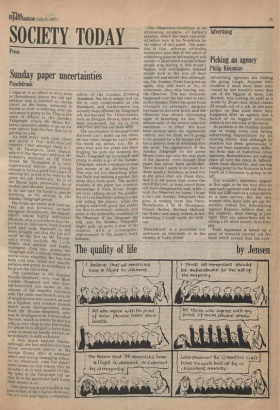The quality of life
-The Observer's condition is an interesting example of Giffen's paradox, which has been expounded before now in his Notebook by the editor of this paper. The paradox is that, whereas orthodox economics says that if the price of something goes on increasing it will sooner or later reach a point where people stop buying it, this doesn't happen with newspapers. Instead people look at the size of their paper bill and decide that although, say, the Sunday Times has gone up again, they still want it. So, to economise, they stop buying, say, the Observer. This has obviously happened over the last year or two, as the Sunday Times has gone from strength to strength, despite increases in its cover price, and the Observer has shown increasing signs of breathing its last. The defiant note of the recent editorial statement — in effect 'We have been around since the eighteenth century and we think we're going to be around for a bit longer yet''-has a distinct note of whistling into the wind. The appearance of the Sunday Telegraph on the scene fifteen years ago was the real start of the squeeze, even though that paper has never been profitable. There doesn't seem to be room for three 'quality' Sundays, at least not at the price they are these days. And it is my guess that, come the end of the year, at least one of them will have disappeared; and, while I wish the Observer no harm, I hope it isn't the Sunday Telegraph that goes. A writing team like Perry Worsthorne, J. W. M. Thompson, Patrick Hutber, Michael Melford, Ian Waller and many others, is not something I could easily do without.
'Punchdrunh' is a journalist not unknown on television or in the vicinity of Tudor Street


































 Previous page
Previous page